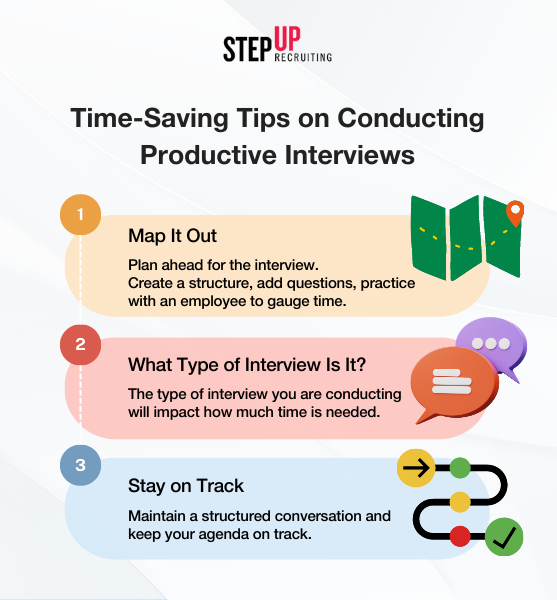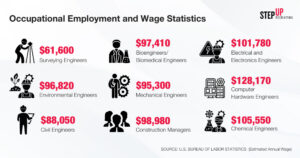How Long Should an Interview Last?
The answer varies. You want enough time to get an accurate impression of the candidate, but you do not want it to stretch out so long that it becomes a waste of everyone’s time. The type of interview, as well as the position being filled, will impact how long an interview should last. Here are some tips on how to get the most out of your next interview in an ideal amount of time.
The type of interview, as well as the position being filled, will impact how long an interview should last. Here are some tips on how to get the most out of your next interview in an ideal amount of time.
Before the Interview
Research Your Interviewee
Go over their application to be prepared for the interview. You will need to know about the candidate’s background to ask relevant questions. If there’s anything you two have in common, don’t hesitate to bring it up at the beginning of the interview to build some rapport and make the candidate feel more comfortable.
Opening Questions
Prepare some questions to get to know more about the candidate. You can ask about the candidate’s interests not related to work. Open questions are a good way to get insightful answers, for example:
- What do you like doing in your free time?
- Tell me something about yourself that is not in your CV.
First Impressions
From the moment the candidate crosses the door, be professional. Always be respectful to keep the environment comfortable.
- Maintain eye contact.
- Sit with your back straight.
- Be open with your body posture to convey tranquility.
1. Map It Out
Before interviewing anyone, you should plan what you want to ask and how you want the interview to proceed. Start by creating a general interview structure. Fill it in with specific questions and talking points. Practice the interview with an employee to get a sense of how long it will take.
2. What Type of Interview Is It?
The type of interview you are conducting will impact how much time is needed. The in-person interview generally takes the longest, lasting between 45 to 90 minutes.
One-To-One Interview
This in-person interview lasts between 45 to 90 minutes. The one-to-one interviews harken back to before the pandemic, and even before the telephone and the internet. These interviews most likely won’t depend on technology to be conducted, so there shouldn’t be hindrances like a sketchy internet connection.
Video
These interviews can last between 30 minutes to two hours. Often treated as an in-person interview, or can be used for the same purpose as a phone interview. Technical issues, like the quality of the internet connection, which might be interrupted at times, might lead to a longer interview.
Competency-Based Interviews
These interviews tend to last anywhere from 45 to 90 minutes. These interviews are behavioral and candidates are put into real work scenarios to see how well they perform.
Group Interviews
Depending on the size of the group these interviews can take around an hour. They are helpful if you want to find out how well a candidate performs in a team environment.
Telephone Interviews
Phone interviews tend to be shorter. Depending on your hiring process, you may use phone interviews in the first round. These interviews should be somewhat general and take only 15 to 30 minutes.
Panel Interviews
In this type of interview, there are two or more interviewers. The length of time is typically 1 and a half hours Keep in mind that these interviews can be intimidating for candidates.
During the Interview
3. Stay on Track
One of the most common ways time is wasted in interviews is when conversations lose structure. While some small talk can be good to make the candidate feel more comfortable, keep your agenda close to keep you on topic. Since you have a limited amount of time to get to know the candidate, you will want to use time wisely to determine if they would be a good fit for the open position. Let the conversation flow naturally while still hitting all the key points. This will ensure you and the candidate are getting your questions answered.
Interviewee Questions
Prepare a list of questions and general points for discussion. Get the most out of the time you have scheduled to achieve your main goal of determining whether the candidate is the right fit for the job, or not. Some of the questions you might ask are:
- Can you tell me about your relevant experience and skills?
- Why do you want to work for our company?
- What do you know about our company and our industry?
- Can you walk me through your process for problem-solving?
- Can you tell me about a successful project you completed and your role in it?
- Can you tell me about your long-term career goals?
Mistakes to Avoid
There are some mistakes you can avoid while making an interview. Some of them are:
Repetitive Questions
With a little planning, each interviewer should have a different list of questions or focus on a separate aspect of the position. Having 5 interviewers asking the same questions or the same type of questions doesn’t tell you anything new about the candidate, but it does tell the candidate that your company or department was not prepared.
Respect for Time
Try to arrange for all the decision-makers to see the candidate on the same day. If that’s not possible, limit it to two rounds of interviews. Candidates who are employed must take time off to interview, which means they are burning sick days and vacation time. Recognize that these hours and days of PTO are hard-earned, and respect the candidate’s time.
Marathons
Avoid holding all-day interviews. If your process truly takes that long, be sure to include a meal and regular breaks between sessions.
Expertise
While it’s important to include decision-makers in the interview process, if the position demands technical skills or specialized knowledge, a CEO or HR Manager may not be the best choice for the technical interviewer. Consider using your own experts to discuss skill sets and experience.
Bias. It’s easy to become focused on one key aspect of a candidate or a search and lose track of all the other important must-haves. Be sure to touch on the same set of skills and experience with every interview.
After the Interview
Candidates will want to know what’s next. A great way to keep candidates happy is to outline the next steps. You can tell them when they will hear back from you with a decision, and what are the next steps in case they’re hired.
The more you plan the interview, the better it will go. Improvisation isn’t a bad thing per se when you’re personalizing some questions to fit a candidate. However, this doesn’t mean that you should improvise the whole interview. You want to keep on track and not waste anyone’s time. Don’t forget to plan according to the type of interview or medium it will take place on. Also, you want to make sure to conduct the right interview for the position you’re trying to fill. If necessary, invite department experts to help you assess the candidate’s abilities. And, ultimately, you want to be as professional as possible. After all, during an interview, you are the face of your company.




